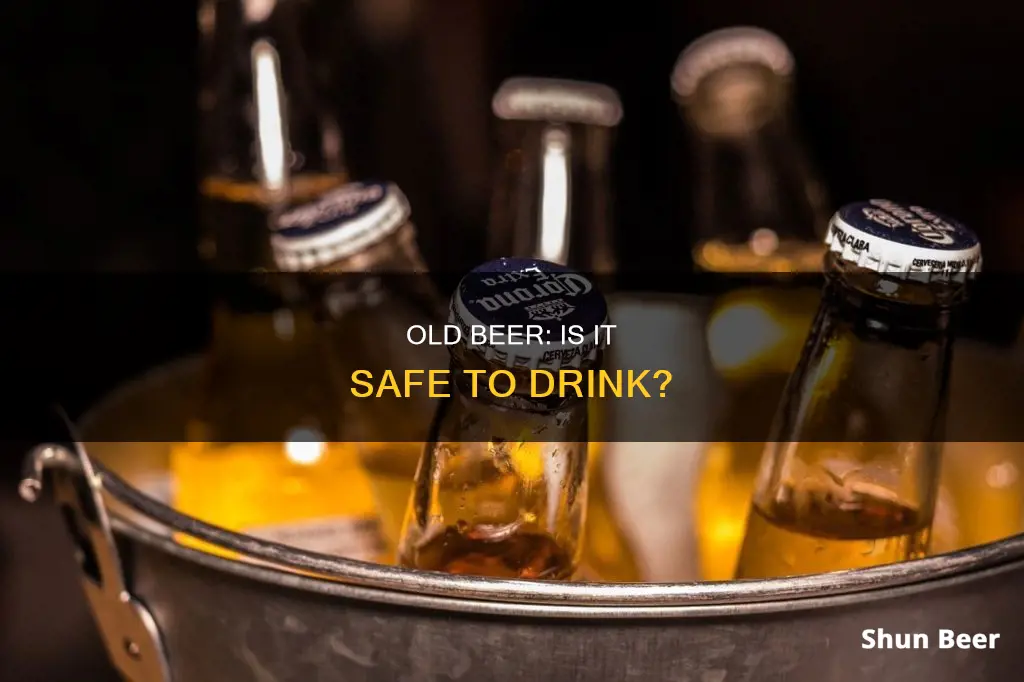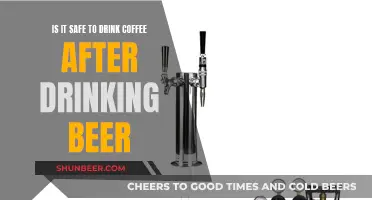
It's happened to the best of us: you find a can of beer at the back of the fridge and wonder, Can I drink this? The short answer is yes. Beer is resistant to spoiling, and even if it's several years old, it won't make you sick. However, the taste will change over time, and it may become flat or vinegary. The flavour of beer is affected by oxygen, heat, and light, so it's best stored in a cool, dark place, preferably a refrigerator, and consumed within three to six months of packaging.
What You'll Learn

Is year-old beer safe to drink?
In most cases, yes.
The good news for beer lovers is that beer is extremely resistant to spoiling. The fermentation process used in brewing, as well as its low pH level and alcohol content, make it very difficult for bacteria to survive. Even if a beer sits on the shelf for years, as long as it's sealed, it's unlikely to make you sick.
But it might not taste very nice.
The taste of beer changes over time, and even if it's safe to drink, it might not be very pleasant. Beers can become flat, overly sweet, or develop a vinegary taste. The hoppiness of beer will also dissipate with age, and any piney, citrusy, or floral aromas will be lost. Beers stored in clear or light-coloured bottles are particularly susceptible to oxidation and will develop a "skunky" taste.
How to keep beer fresh.
To keep beer fresh, store it in a cool, dark place, preferably a refrigerator. If storing at room temperature, make sure it's not exposed to sunlight. Keep bottles and cans upright to minimise exposure to oxygen.
At room temperature, beer lasts about 5 to 9 months beyond the expiration date listed on the label. In a refrigerator, unopened beer can last up to an additional two or three years. Once opened, beer has a shelf life of about a day.
Ducks and Beer: A Curious Conundrum
You may want to see also

How do I know if my beer has gone bad?
Beer doesn't actually "go off" like milk does. It doesn't become unsafe to drink, but its taste will change. So, if you're drinking a beer and wondering if it's gone bad, it's probably a matter of taste.
There are some tell-tale signs that a beer has gone bad. If it's lost its fizz, that's a sign that the seal has been broken and the beer will taste different. If a beer that isn't supposed to be tangy or acidic has a vinegary taste, that's a sign that bacteria have gotten into the beer and you should throw it out.
Beers can also taste "skunky", which is caused by exposure to UV light. Hop compounds are sensitive to light and can become "light-struck", giving off an unpleasant skunky taste. This is why beer usually comes in dark bottles or aluminium cans, to block out UV rays.
Oxidation is another process that can make beer taste bad. Oxygen interacts with the compounds from malt, yeast and hops, causing oxidation and a disappointing papery taste. This process happens faster in warmer temperatures, so it's best to store beer in a refrigerator.
If you're drinking a beer and it tastes like "wet cardboard", or it's overly sweet, or it's gone flat, or it tastes skunky, then it's probably gone bad.
Raw Vegans and Beer: What's the Verdict?
You may want to see also

How long does beer last in the fridge?
Beer is a perishable product that will eventually go bad, even if stored in a refrigerator. However, the good news is that it won't make you sick. The fermentation process used in brewing, along with its low pH level and alcohol content, makes beer an unfriendly environment for harmful microorganisms. So, even if a beer sits in your fridge for years, it's unlikely to cause any health issues.
That being said, the taste of beer will change over time. Beer is susceptible to oxidation, which occurs when oxygen interacts with the compounds from malt, yeast, and hops. This process causes a disappointing papery or stale taste, often described as "wet cardboard." Heat speeds up oxidation, so it's essential to store beer in a cool place, preferably a refrigerator. Major temperature changes can also affect the taste, so avoid leaving beer in a hot car or in direct sunlight.
Light, especially ultraviolet light, is another factor that can ruin beer. Hop compounds are sensitive to light and can become "light-struck," resulting in an unpleasant skunky taste. Brown bottles and aluminium cans are effective at blocking out light, whereas clear or light-coloured bottles offer less protection and can result in faster oxidation and the development of a skunky flavour.
So, how long does beer actually last in the fridge? Well, it depends on a few factors. Firstly, the type of beer matters. Stronger beers, such as stouts and porters, tend to have a longer shelf life than lighter beers like lagers and pilsners. Additionally, the packaging and storage conditions play a role. Canned beer typically lasts longer than bottled beer because cans block out light completely, whereas bottles, especially clear or light-coloured ones, can let light through, accelerating oxidation.
In general, unopened beer stored in a refrigerator can last for up to two to three years beyond its expiration date. However, this doesn't mean it will taste the same as a fresh beer. The longer it's stored, the more the flavour will change. Beers with hoppy aromas, like IPAs, are best consumed fresh to enjoy their full flavour and aroma. On the other hand, malt-forward beers can develop sweet, bready, or caramel-like flavours with age.
To summarise, while beer can last for several years in the fridge, the optimal time frame for enjoying its intended flavour is within three to six months of packaging or before its best-by date. So, if you're a beer connoisseur, pay attention to those dates and store your beer properly to ensure the best drinking experience.
Beer Drinking: Blood Sodium Drop?
You may want to see also

How do I store beer to maximise its shelf life?
Beer can be safely consumed past its expiration date, but its flavour will degrade over time. To maximise its shelf life, beer should be stored in a cool, dark place, like a refrigerator, and kept away from temperature fluctuations. Beer should also be stored upright to minimise oxidation and avoid direct sunlight, as UV rays can cause beer to lose its flavour.
When storing beer, it is important to consider the type of beer and the packaging it comes in. Stronger beers, such as stouts, porters, and high-alcohol content beers, tend to have a longer shelf life than lighter beers like lagers and pilsners. Additionally, canned beer typically lasts longer than bottled beer because cans do not let any light in, which slows down the oxidation process. However, even canned beer will eventually lose its freshness, so it is not advisable to expect a five-year-old can of beer to taste the same as a fresh one.
The ideal temperature for storing beer is 38°F, where it can last for up to 300 days. At room temperature, beer has a much shorter shelf life, lasting only 30 days at 72°F. Beer should also not be stored at temperatures above 90°F, as it will only remain fresh for three days under these conditions.
It is worth noting that opened beer has a much shorter shelf life than unopened beer. Opened beer should be consumed within a day or two, as oxidation will quickly degrade its flavour.
By following these storage guidelines, you can maximise the shelf life of your beer and enjoy it at its freshest and most flavourful.
Beer and Chantix: Is It Safe to Mix?
You may want to see also

What does expired beer taste like?
While expired beer is usually safe to drink and won't make you sick, its flavour will degrade over time. The difference between fresh and old beer is dramatic. While fresh lager presents bright hops flavour and refreshing bitterness, year-old beer is distinctly malty, sweet, and flat.
The organic compounds that make beer smell and taste great are degraded by exposure to light, oxygen, and heat. The oxygen inside the beer causes oxidation, which results in a stale, cardboard-like flavour, accompanied by a note of sherry. Beers with more alcohol by volume have a longer shelf life.
The speed of oxidation depends on the alcohol content of the beer and how it's stored. Beers stored in refrigerators slow the ageing process, so it's best to choose beer from the cooler, not the shelf. Beers with higher alcohol content by volume have a longer shelf life.
The beer's "hoppiness" also dissipates with age. Hop aromas are time-sensitive, so the piney, citrusy, or floral hop aromas that characterise a hop-forward beer won't be found in older beers.
Finally, there's the dreaded skunkiness of beer left out in the sun for too long. This is caused by exposure to ultraviolet light, which causes a chemical reaction in the hop compounds, resulting in an unpleasant skunky taste.
Beer and Vodka: Mixing Alcohol Safely
You may want to see also
Frequently asked questions
Yes, it is safe to drink beer that is a year old. Beer doesn't "expire" in the same way that milk does. The brewing process kills off unwanted organisms, and the alcohol, low pH, and antimicrobial activity of hops create an environment in which harmful pathogens or bacteria cannot survive.
No, the taste of a year-old beer will be different. Beer is a perishable product that stales when exposed to light, oxygen, and heat, which degrade the organic compounds that make beer smell and taste great. The longer a beer is stored, the more its flavour will change.
To maximise its shelf life, beer should be stored in a cool, dark place, away from temperature fluctuations. It should be kept upright to minimise oxidation and should not be exposed to direct sunlight, as UV rays can cause beer to lose its flavour.







